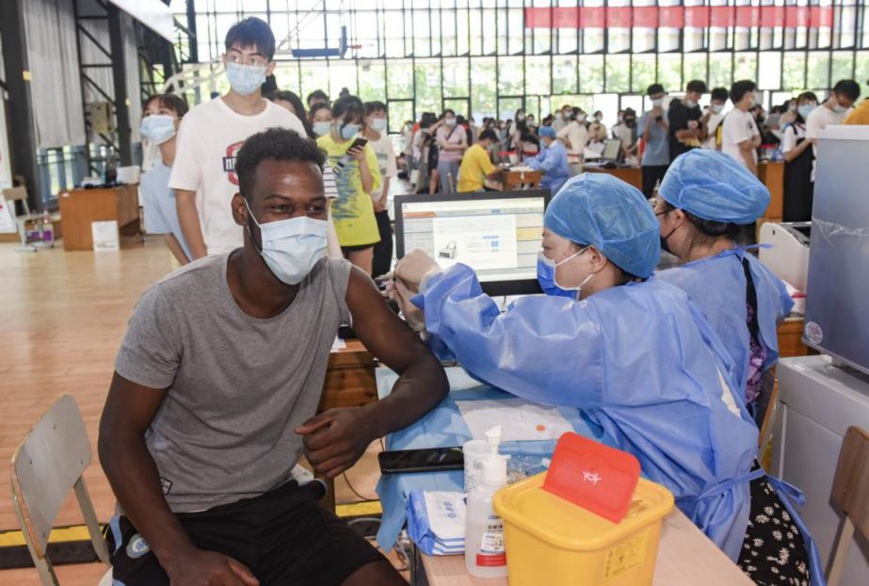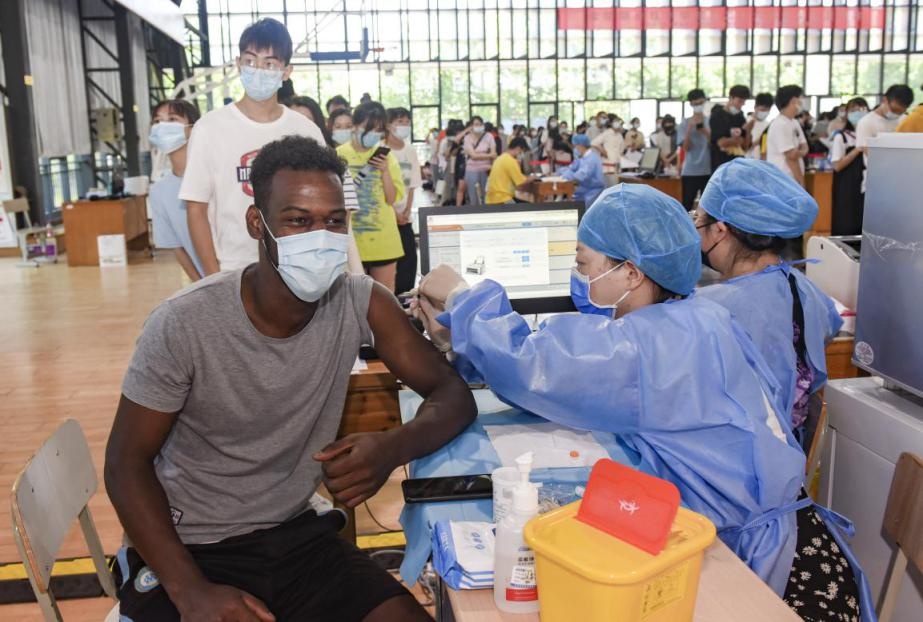By Qu Song, People's Daily

A foreigner is vaccinated in Jinhua, east China's Zhejiang province, June 6, 2021. (Photo by Li Jianlin/People's Daily Online)
China had offered over 700 million doses of COVID-19 vaccines and concentrates for the world as of July 29, according to the latest data released by China's Joint Prevention and Control Mechanism of the State Council. The figure is more than that of all other nations combined.
China has always called for closer international cooperation on vaccines to ensure their accessibility and affordability in developing countries and to make them a global public good.
Despite its own huge population and tight vaccine supply, China has actively responded to other countries' requests for vaccine cooperation, which has injected confidence and strength into the global fight against the pandemic.
The Global Alliance for Vaccines and Immunization recently announced that it has signed advance purchase agreements with Chinese vaccine manufacturers Sinopharm and Sinovac, whose COVID-19 vaccine products have been included in the WHO's Emergency Use Listing after strict reviews by WHO's Strategic Advisory Group of Experts on Immunization. It means that the doses produced by the two companies will join the COVID-19 Vaccines Global Access (COVAX) program to make greater contribution to pandemic control in developing countries.
As Chinese vaccines are being administered to a growing number of people around the world, their safety and efficacy are backed by more and more data.
Many developing countries obtained their first batches of vaccines from China, and that's why Chinese vaccines are hailed as a "timely rain."
Teodoro Obiang Nguema Mbasogo, President of Equatorial Guinea, said the Chinese vaccines have brought hope for the country's fight against the epidemic. President Emmerson Mnangagwa of Zimbabwe compared the vaccines donated by China to a light at the end of a dark tunnel.
The nearly 2 million Cambodians probably couldn't have been vaccinated were it not for China's assistance and the doses purchases from China, said Prime Minister of Cambodia Hun Sen when addressing the opening ceremony of the 26th International Conference on the Future of Asia.
Gaston Browne, Prime Minister of Antigua and Barbuda, said China has always been leading the world when it comes to helping and supporting developing countries. China's generous aid has become even more precious as certain countries are hoarding vaccines, he added.
Apart from vaccine donation and export, China is also cooperating with developing countries, including the UAE, Egypt, Indonesia, Turkey, and Brazil, for joint research and production of COVID-19 vaccines.
It supports relevant enterprises to conduct phase III clinical trials with partners from the above countries, so as to contribute to global anti-pandemic efforts by expanding local vaccine production capacity. So far, production capacity in these nations has expanded to 200 million doses.
This February, Brazilian biologic research center Butantan Institute carried out a mass vaccination trial in Serrana, São Paulo. After most residents received two shots of Sinovac vaccines, the number of symptomatic cases in local community dropped 80 percent, and hospitalizations by 86 percent. More importantly, deaths plunged by 95 percent. Besides, infections among the residents under 18 and other groups ineligible for the vaccine also declined.
To build the strongest immunity barrier, protect the health of foreigners in China, and ensure their work, life and studies in the country, China has included the eligible age group among foreigners in the country into the scope of inoculation with domestic vaccines. So far, more than 600,000 doses of COVID-19 vaccines have been administered to over 350,000 foreigners in the country.
The efforts of the Chinese government and medical staff to advance the vaccination drive are melting the hearts of many foreigners. Recently, a courier in Shanghai shared on a short video platform a special order he received. According to him, a German guy surnamed Frank living in Shanghai bought drinks for health workers at a community health center in Shanghai, just to express his gratitude for their vaccination efforts.
China has always called for closer international cooperation on vaccines to ensure their accessibility and affordability in developing countries and to make them a global public good.
Despite its own huge population and tight vaccine supply, China has actively responded to other countries' requests for vaccine cooperation, which has injected confidence and strength into the global fight against the pandemic.
The Global Alliance for Vaccines and Immunization recently announced that it has signed advance purchase agreements with Chinese vaccine manufacturers Sinopharm and Sinovac, whose COVID-19 vaccine products have been included in the WHO's Emergency Use Listing after strict reviews by WHO's Strategic Advisory Group of Experts on Immunization. It means that the doses produced by the two companies will join the COVID-19 Vaccines Global Access (COVAX) program to make greater contribution to pandemic control in developing countries.
As Chinese vaccines are being administered to a growing number of people around the world, their safety and efficacy are backed by more and more data.
Many developing countries obtained their first batches of vaccines from China, and that's why Chinese vaccines are hailed as a "timely rain."
Teodoro Obiang Nguema Mbasogo, President of Equatorial Guinea, said the Chinese vaccines have brought hope for the country's fight against the epidemic. President Emmerson Mnangagwa of Zimbabwe compared the vaccines donated by China to a light at the end of a dark tunnel.
The nearly 2 million Cambodians probably couldn't have been vaccinated were it not for China's assistance and the doses purchases from China, said Prime Minister of Cambodia Hun Sen when addressing the opening ceremony of the 26th International Conference on the Future of Asia.
Gaston Browne, Prime Minister of Antigua and Barbuda, said China has always been leading the world when it comes to helping and supporting developing countries. China's generous aid has become even more precious as certain countries are hoarding vaccines, he added.
Apart from vaccine donation and export, China is also cooperating with developing countries, including the UAE, Egypt, Indonesia, Turkey, and Brazil, for joint research and production of COVID-19 vaccines.
It supports relevant enterprises to conduct phase III clinical trials with partners from the above countries, so as to contribute to global anti-pandemic efforts by expanding local vaccine production capacity. So far, production capacity in these nations has expanded to 200 million doses.
This February, Brazilian biologic research center Butantan Institute carried out a mass vaccination trial in Serrana, São Paulo. After most residents received two shots of Sinovac vaccines, the number of symptomatic cases in local community dropped 80 percent, and hospitalizations by 86 percent. More importantly, deaths plunged by 95 percent. Besides, infections among the residents under 18 and other groups ineligible for the vaccine also declined.
To build the strongest immunity barrier, protect the health of foreigners in China, and ensure their work, life and studies in the country, China has included the eligible age group among foreigners in the country into the scope of inoculation with domestic vaccines. So far, more than 600,000 doses of COVID-19 vaccines have been administered to over 350,000 foreigners in the country.
The efforts of the Chinese government and medical staff to advance the vaccination drive are melting the hearts of many foreigners. Recently, a courier in Shanghai shared on a short video platform a special order he received. According to him, a German guy surnamed Frank living in Shanghai bought drinks for health workers at a community health center in Shanghai, just to express his gratitude for their vaccination efforts.
 Menu
Menu
 China keeps its promise of making COVID-19 vaccines global public good
China keeps its promise of making COVID-19 vaccines global public good
















